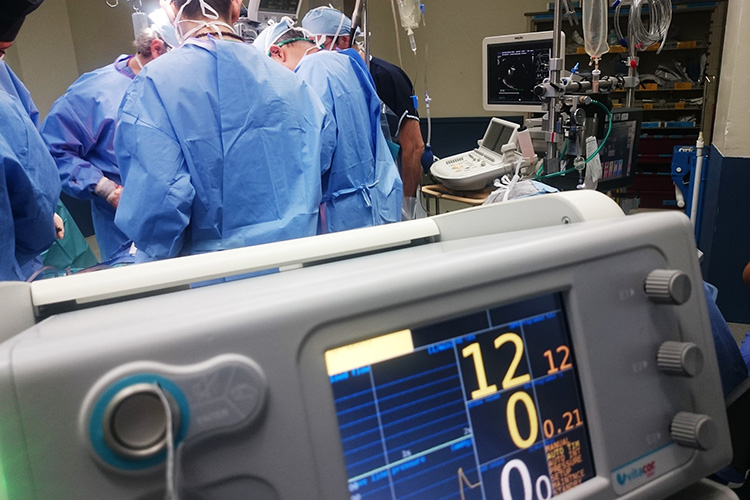The bishops have issued a note in which they highlight the "moral rupture" that the approval of the euthanasia law in Spain represents and urge the promotion of palliative care instead of procuring death.
The euthanasia law is now in its second phase of processing after passing through the Senate. A law that, instead of promoting the care of the weakest, it opens the door to a sieve of provoked deaths, by providing, for example, that the so-called "right-to-die benefit" can be provided in homes as well as in nursing homes or social-health centers.
In view of the first step in the approval of this law, which is expected to be passed in February, approximatelythe bishops of the Spanish Bishops' Conference have published a note in which they express their total opposition to this legislation, which contemplates provoked death as the most "a shortcut that allows us to save human and economic resources"..
They also urged the promotion and development of palliative care in our country, "which helps to live through serious illness without pain and to the integral accompanimentand therefore also spiritually, to the sick and their families".
Day of prayer for life
The prelates have also called on Spanish Catholics to a Day of Fasting and Prayer next Wednesday, December 16to ask the Lord to inspire laws that respect and promote the care of human life".
NComplete letter from the Spanish Episcopal Conference in view of the approval of the euthanasia law in the Spanish Congress of Deputies
The Congress of Deputies is about to finalize the approval of the Organic Law regulating euthanasia. The processing has been carried out in a suspiciously accelerated manner, in times of pandemic and state of alarm, without listening or public dialogue. The fact is particularly serious, since it establishes a moral breach; a change in the purposes of the Statefrom defending life to being responsible for the death inflicted; and also of the medical professionThe aim is "to cure or at least to alleviate, in any case to console, and never to intentionally provoke death". It is a proposal that matches the anthropological and cultural vision of the dominant systems of power in the world.
2.- The Congregation for the Doctrine of the Faith, with the express approval of Pope Francis, published the letter Samaritanus bonus on the care of people in the critical and terminal phases of life. This text illuminates the reflection and moral judgment on this type of legislation. Also the Spanish Episcopal Conference, with the document Sowers of hope. Welcoming, protecting and accompanying in the final stage of this vine.a, offers some clarifying guidelines on the issue.
3.- We urge the promotion of the palliative carethat help to live the serious disease without pain and to the integral accompanimentand therefore also spiritually, to the sick and their families. This holistic care relieves pain, consoles and offers the hope that comes from faith and gives meaning to all human life, even in suffering and vulnerability.
4.- The pandemic has highlighted the fragility of life and has aroused demand for care, at the same time as indignation at the discarding of care for the elderly. Awareness has grown that ending life cannot be the solution to a human problem. We have appreciated the work of health care workers and the value of our public health care system, even calling for its improvement and greater budgetary attention. Death by provocation cannot be a shortcut that allows us to save human and economic resources in palliative care and integral accompaniment. On the contrary, in the face of death as a solution, it is necessary to invest in the care and closeness that we all need in the final stage of this life. This is true compassion.
5.- The experience of the few countries where it has been legalized tells us that euthanasia incites death to the weakest. By granting this supposed right, the person, who is experienced as a burden on the family and a social burden, feels conditioned to ask for death when a law presses him or her in that direction. The lack of palliative care is also a expression of social inequality. Many people die without being able to receive this care and only those who can afford it are able to pay for it.
With the Pope we say: "Euthanasia and assisted suicide are a defeat for everyone. The response to which we are called is never abandon those who suffer, never give up, but care and love in order to give hope.". We invite you to respond to this call with prayer, care and public witness that will foster a personal and institutional commitment to life, care and a genuine good death in companionship and hope.
7.- We ask those who have responsibility in making these serious decisions to act in conscienceaccording to truth and justice.
8.- Therefore, we call upon Spanish Catholics to a Day of Fasting and Prayer next Wednesday, December 16to ask the Lord to inspire laws that respect and promote the care of human life. We invite as many people and institutions to join this initiative.
We pray to Mary, Mother of Life and Health of the Sick and to the intercession of St. Joseph, Patron of the Good Death, in his Jubilee Year.







